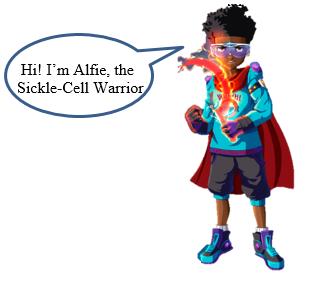What is Sickle-Cell Disease?
Sickle cell disease (SCD) is an inherited condition that affects the red blood cells and various organs in the body. SCD affects the production of a protein called haemoglobin that carries oxygen throughout the body.
Each person inherits two haemoglobin genes, one from each parent. A normal gene will make normal haemoglobin (Hb). Sickle cell genes produce abnormal haemoglobin (HbS) which causes the red blood cells to change from a soft doughnut shape to a hard, sticky and sickle shape [like a banana].
Sickle cells can get stuck in small blood vessels and block the flow of blood and oxygen to organs within the body. These blockages can cause many problems.
The most common types of sickle cell disease are haemoglobin SS, haemoglobin SC, and sickle beta thalassemia.
Potential Health Problems of people with sickle cell disease
Infections
The spleen helps the body fight infections. Sickle cells may get caught in the spleen, preventing it from working as well as it should. As a result, people with sickle cell disease are more likely to get infections. Children are put on antibiotics until their immune system matures.
Anaemia
Sickle cells do not live as long as normal red blood cells. This causes anaemia (a low blood count). Anaemia can cause weakness and fatigue.
Pain
Sickle cells that get caught in the small blood vessels of the body cause the interruption of oxygen and blood flow; these ‘sickling’ crises can be very painful. This includes pain and swelling of the hands and feet.
Acute Chest Syndrome
Blockage of the flow of blood to the lungs can cause acute chest syndrome (ACS). ACS is similar to pneumonia; symptoms include: chest pain, coughing, difficulty breathing, and fever. It can be life threatening and should be treated in a hospital.
Stroke
Sickle cells can clog blood flow to the brain and cause a stroke. A stroke can result in lifelong disabilities and learning problems. Children under 16 are at the highest risk for stroke.
Living with Sickle-cell
Pursue a Healthy Lifestyle
Like all people, you should strive to maintain a healthy lifestyle that includes:
» A nourishing diet
» Enough sleep
» Regular physical activity
» People with SCD often tire easily, strenuous activities should be avoided.
Prevent and Control Complications
Avoid situations that may set off a crisis. Extreme heat or cold, as well as abrupt changes in temperature, are often triggers.
Avoid overexertion and dehydration. Take time out to rest and drink plenty of fluids.
Support from family, friends and professionals
Like any other chronic illness sickle cell is difficult to live with. It is important to ask for help and talk to your family and friends. Receiving help and advice, sharing experiences and meeting with others with sickle cell disorder can be beneficial to you.
What is Sickle-cell trait?
Sickle Cell Trait (SCT) is an inherited blood disorder.
It is important to know if you have sickle cell trait.
Sickle cell trait is inherited from your parents, like hair or eye colour. If one parent has sickle cell trait, there is a 50% (1 in 2) chance with each pregnancy of having a child with sickle cell trait. Sickle cell trait rarely causes any health problems. [Not enough is known about SCT to definitively state that it doesn’t cause health problems]
Potential Health Problems of people with sickle cell disease
Jaundice
This is a yellowing of the eyes and skin. It is painless and occurs because of rapid breakdown and death of sickled red blood cells.
Mental Health
Living with a lifelong chronic disease can cause a multitude of social, economic and personal problems.
Complications during pregnancy
A woman with sickle cell disease can have a healthy baby. However, risks are involved; both she and the baby should be closely monitored by a healthcare provider. Prenatal care is very important!
Other problems include:
» Chest pain and trouble breathing
» Organ damage
» Gallstones
» Painful erections in men
» Blood in the urine
» Eye disease
» Leg ulcers
